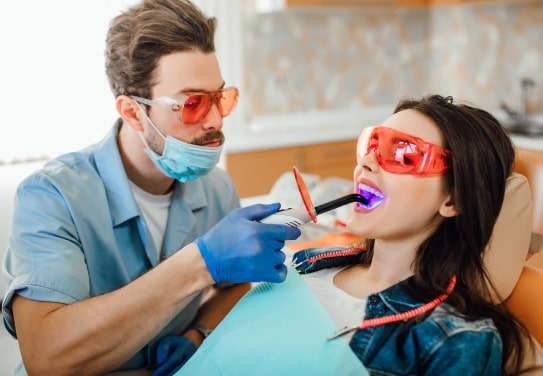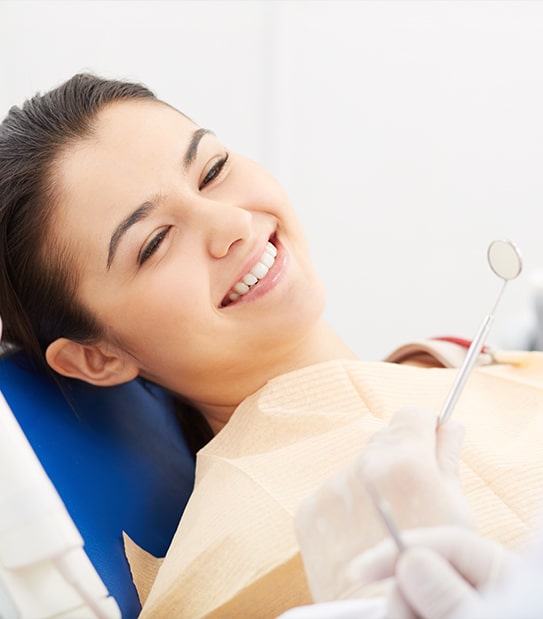Transform Your Smile with Advanced Laser Dentistry
Treat gum disease, recurring ulcer problems, and gum pigmentation with laser dentistry that allows faster healing, less bleeding, less scarring, and less anesthesia.
Laser Dental Treatment in Chicago
Laser dental treatment is a separate branch of dentistry that focuses on the use of lasers to treat several dental concerns. It made its commercial debut in 1989 when a laser was used to perform a tooth tissue procedure. However, it is now the preferred FDA-approved treatment due to its comfort, effectiveness, and affordability which is better than other dental treatments.
In laser dentistry, the dentist focuses a thin beam of laser light on the targeted tissue of the mouth so that it can be molded or removed. TDS The Dental Specialist’s expert dentist provides the best laser dental treatment in Illinois.
TDS The Dental Specialist, the best laser dentistry clinic in Illinois, offers laser dentistry to treat patients’ oral health concerns in a comfortable and effective way.
Laser dentistry is a type of modern and revolutionary dental care that eliminates the risks associated with traditional metal dental tools. The laser dentist in Chicago at TDS The Dental Specialist uses lasers in the majority of the procedures to repair damage without causing irritation. Choosing laser dental treatments helps to eliminate issues caused by traditional dental procedures like heat, pressure, and vibration. The best part is that no anesthesia is required for the procedure, and the laser is incredibly thin and can be used to make precise incisions whenever necessary, providing early healing and painless procedure.
Types of Lasers Used by Dentists
There are two primary types of lasers used in dentistry, each with a different wavelength of light to cut the targeted tissues, namely:
Soft Tissue Lasers
Their wavelength of light is easily be absorbed by water and hemoglobin. Hence, they are used to cut soft tissues and, as they penetrate deeper, they also help seal the nerve endings as well as ruptured blood vessels. They are mostly used for to reshape gums to correct uneven or disproportionate gum lines (i.e. a gummy smile), remove dead or swollen tissues (including the elimination of folds in oral soft tissue caused by ill-fitting dentures), modify the lengthening of the dental crowns, and address limited tongue movement.
Hard Tissue Lasers
They have a wavelength that easily passes through the bone and water. They are typically used on imperfect teeth to remove a tiny portion of the tooth, repair worn-down dental fillings, reshape it for composite bonding, or prepare it for other procedures. Mostly, they are used to detect cavities, prepare teeth for dental fillings, and treat tooth sensitivity to hot and cold temperatures.


The Use of Lasers in Different Dental Procedures
Professional Teeth Whitening
Lasers are used as a light source to cure the bleaching agents of the teeth (i.e. hydrogen peroxide solution) and speed up the teeth whitening procedure in the dental clinic.
Treatment of Oral Hypersensitivity (a short, sharp tooth pain)
Lasers help seal the painful sites of the tooth or numb it, thereby reducing pain slightly after 24 hours.
Treatment of Dental Decay or Cavities
Lasers are cutting instruments that can remove tooth decay from the inside of the tooth and prepare its surrounding enamel to receive a dental filling.
Treatment of Gum Disease
During root canal therapy, lasers can help reshape the gums and heat kill the bacteria during root canal therapy.
Treatment of Tongue Frenulum Attachment
The thick or tight frenulum can be treated by laser frenectomy.
Removal of Lesions or Tissue Biopsy
Lasers are used to remove a small section of the mouth tissues to be examined for oral cancer and remove any lesions inside the mouth and to relieve pain from canker sores.
Taking of Precise Teeth Impressions
The laser CAD/CAM technology can be used to take better teeth impressions for the construction of dental crowns, veneers, or bridges.
Benefits of Using Lasers in Dental Treatments
- With laser dental treatments, the chances of having an infection are relatively low because the lazer’s heat sterilizes the site of treatment. In addition, there is significantly less bleeding as compared to conventional dental treatments as lasers encourage blood clotting.
- If the laser dental procedures go well, the likelihood of pain, swelling, or any discomfort is minimal to zero.
- There is no need for drilling or making of incisions and sutures; lasers are sufficient to perform the required dental work.
- Some laser dental procedures do not require anesthesia.
- After a laser dental treatment, the wounded site heals faster and there is a possibility for tissue regeneration.
- The lasers used in dental treatments are less intensive which means they cause less damage to the surrounding tissues.
To get the benefits of the best laser treatment for managing dental issues, schedule an appointment with the best laser dental clinic in Chicago, TDS The Dental Specialist.
